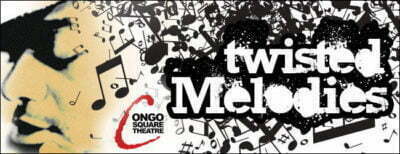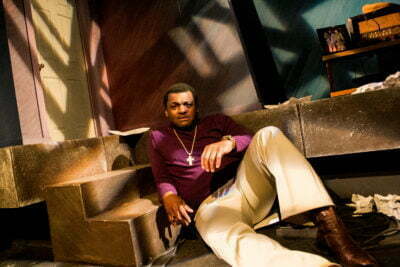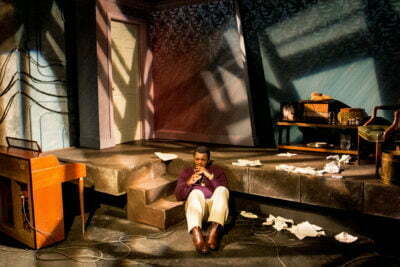Twisted Melodies
By Kelvin Roston, Jr.
Directed by Samuel G. Roberson, Jr.
Produced by Congo Square Theatre, Chicago
New Play Inspires Action on Mental Illness
That you or somebody you love could be mentally ill is a terrifying prospect. I think most people would feel helpless, and therefore ignore something potentially life-threatening. Even to someone with a basic knowledge of treatment and service options, dealing with depression, anxiety, or bi-polar disorder, to name a few, is confusing and dispiriting, especially when the person afflicted seems uncompliant, or the treatments are ineffective. These problems are also tough to get right in drama, but as part of the August Wilson New Play Initiative, Congo Square bravely took upon itself the responsibility of making positive change in what we do about mental health. Twisted Melodies, which explores the suicide of blues musician Donny Hathaway, is a work that sends us to the darkest place imaginable, but it is one of those plays that has true potential to improve the world.

The one-man show is written and performed by Kelvin Roston, Jr. It takes place on the day of Hathaway’s death, during which he abandoned a recording session because he was convinced there was a machine inside his brain that was monitoring his thoughts in order to steal his music. He went back in a panic to his room in the Essex Hotel, still plagued by the belief he was being spied on by some malicious force. The story-telling device at work here is that Hathaway can see us, the audience, as well, but ironically regards us as projections from his own imagination. He hopes that by explaining to us his life-long negotiation with paranoid schizophrenia, he can resolve his own confusion.
Hathaway tells us that he was not naturally inclined towards music as a child. He was talented, yes, but his grandmother had to force him to practice piano when he would have preferred doing other things. As he got older, he invented an imaginary friend called Duke to compensate for traits he disliked in himself. At first, Duke was just a fantasy under Hathaway’s control, until one day, Duke strangled him, and Hathaway felt like he was actually being choked. More terrifying visions followed, but Hathaway had new inspiration for his music, and found playing was the only thing that soothed him. Roston accompanies himself on the piano to Hathaway songs like “The Ghetto-Part 1,” “I Love You More Than You’ll Ever Know,” and “Giving Up,” making Twisted Melodies in one way an incredibly grim revue.

Besides being an excellent singer and pianist, Roston is totally convincing as Hathaway. He has help from the design team, including video producer Dre Robinson and choreographer Joel Hall, and scenic designer Andrei Onegin, who built a claustrophobic environment where the walls really do close in. Hathaway complains about being unable to keep time and space coherent, and the projections force us to experience his point of view. But the show relies on Roston’s performance, and he knew exactly what challenges he was up for when writing. Hathaway is deeply sympathetic, but sometimes frightening, and always frustrating. He speaks of how much he admired his collaborator, Roberta Flack, and his wife, Eulaulah, in terms not only tender, but excited. But when he describes the side-effects of his medications—severe pain, immobility, loss of emotions—Roston makes his suffering is visceral.
As part of Congo Square’s effort to improve mental health treatments, they have partnered with the National Alliance on Mental Illness, and are donating 10% of all ticket sales. There will also be talk-backs following the performance, and the one I went to was among the most productive talk-backs I have been to, due in large part to the courage and honesty of the speaker. I hope the rest will be like that, though in some ways, it’s up to the audience. Art cannot fix problems by itself, but it can direct peoples’ attention to something that has been treated secretively. Roston and director Samuel Roberson understand this, which is why Twisted Melodies has potential to be so effective, and fosters hope despite Hathaway’s end. Though the activism is integral to the production, it is not necessary to justify this play as a piece of art. Twisted Melodies is upsetting, but supplies a fascinating performance.
Highly Recommended
Jacob Davis
[email protected]
Reviewed May 16, 2015
This show has been Jeff recommended.
For more information, see Twisted Melodies’ page on Theatre in Chicago.
Playing at the Athenaeum Theatre, 2936 N Southport Ave, Chicago. Tickets are $17.50-37.50; visit www.congosquaretheatre.org. Plays Thursdays, Fridays, and Saturdays at 7:30 pm, and Saturdays and Sundays at 2:00 pm through June 14. Running time is ninety minutes with no intermission.
